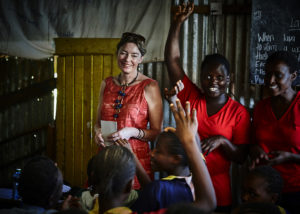Menstruation: Could lack of education be pushing Kenyan women to despair?

Menstruation: Could lack of education be pushing Kenyan women to despair?
With more that 40% of school girls in Kenya having never used proper menstrual products, could it be a case of cost, accessibility or mere lack of education. We explore the available options and the possible causes of the unavailability of these sanitary products.
By Lilian Kaivilu
@liliankaivilu
Early 2019, a shortage of tampons in local shops caused a stir in mainstream and social media. Retailing between Sh140 and Sh250 per pack, tampons are some of the menstrual products used by middle and upper-middle class women, according to Menstrual Health in Kenya Country Landscape Analysis, a study done by FSG and Sponsored by the Bill and Melinda Gates Foundation. The shortage of supply was blamed on delays in clearance by the Kenya Revenue Authority and challenges in supply of raw materials.
While many women can neither access nor are aware of any form of menstrual products, others simply cannot afford the essential commodity. Despite the government’s pledge to provide sanitary pads to girls in all public schools in Kenya, the report indicates that 42 percent of Kenyan girls still do not access the same. And with their limited options, they rely on well-wishers and non-governmental organizations in order to obtain menstrual products.

Joyce Odhiambo is one such girl. She has been using reusable sanitary towels given to her in 2017 by Garden of Hope Foundation, a community based organization based in Kibera, Nairobi. Besides the supply of menstrual products, the 19-year-old says she has received education on menstrual hygiene. School based programmes, according to Unesco, remain the best option to reach more than 500 million primary school children across the globe. According to Odhiambo, the three-piece set of sanitary towels was to last three years. “By end of this year, it will have expired. But it has saved me a lot of money,” she says.
On average, a pack of eight sanitary pads in Nairobi costs between Sh50 and Sh200 depending on the brand. With no consistent source of income, Odhiambo says the reusable sanitary towel has saved her a lot of money. “All I need is a piece of bar soap to wash the three pieces of reusable towel. This costs me about Sh20 and can last upto three months since I use the bar soap strictly for this purpose.” According to Unicef, one in every 10 girls in Africa misses school during menstruation.

With some education on menstrual hygiene, Odhiambo is confident that she is practising the right standards in using the towels. “It is a beautiful experience for any woman; but only if she has the right education and products to cater for menstruation. Since I learnt that menstruation is a natural cycle and a beautiful thing for any woman, I view it as any normal process in my body,” she says. But this is not the story for hundreds of girls across the country who cannot afford menstrual products. To others, menstruation is a time for isolation from their families as it is deemed an ‘unclean time’ for them.
Camilla Wirseen, founder of The Cup Foundation emphasizes on the need for proper education on the different menstrual products. The uptake of the menstrual cup depends a lot on education. There is need for education, not just to the girls but also to teachers and parents.”
Menstrual Health in Kenya Country Landscape Analysis, a study done by FSG and Sponsored by the Bill and Melinda Gates Foundation found that the provision of sanitary pads and menstrual cups to girls aged between 14 and 16 years reduced sexually transmitted infections prevalence and menstrual cups reduced the prevalence of bacterial vaginosis.
Although some women cite financial constraints as a key hindrance to their choice of menstrual products, Camilla says the menstrual cup is quite affordable. “It can be used for 10 years. All one needs is to properly clean by boiling it in a clean tin,” says Camilla. The cup can last up to 12 hours and does not require soap to wash. She, however, laments that some misconceptions associated with the use of the menstrual cup have scared many women from using it. But with a cost of between Sh2,500 to Sh3,500, and with a life span of upto 10 years, the menstrual cup may save many girls the otherwise unaffordable cost of alternative menstrual products. For instance, a girl who would use one packet of disposable sanitary pads at Sh50 every month will use Sh600 per year, amounting to Sh6,000 in 10 years.
Stella Nekesa, a resident of Bombolulu in Kibera completed her secondary education in 2018. She has used the reusable sanitary towels since then. “Unlike most disposable pads, the reusable pad is heavy and does not soak fast. I find it convenient especially overnight,” she explained. In order to wash the cloth, Nekesa says she uses a piece of bar soap. “But you cannot wash the pad with hot water as it will lose its quality,” she says.
In order to address the existing gaps in menstrual hygiene management (MHM) in the country, Mercy Miriti, Chief Executive Officer WASH Alliance Kenya, says there is need to ensure that all actors communicate standard messages on MHM to their beneficiaries through proper coordination at all level of governance. “There is also need for continuous sensitization on menstruation to ensure that everyone understands the facts about menstruation,” says Miriti. She opines that including MHM in the school curriculum will enable children understand the changes to expect as they grow up and approach puberty.
Every woman should be able to make a choice on the products that they want to use to manage their menstruation. “Just as condoms are easily accessible, it should be a priority to make a variety of sanitary products accessible and an affordable price to all women and girls regardless of their religion, age, cultural background and social status,” says Miriti.

